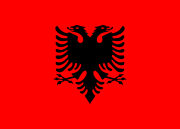The Self-determination Movement Lëvizja Vetëvendosje | |
|---|---|
 | |
| Chairman | Albin Kurti |
| Parliamentary leader | Mimoza Kusari-Lila (acting) |
| Founded | 12 June 2005 |
| Preceded by | Kosova Action Network |
| Headquarters | Rr. Behije Dashi, nr. 31, Pristina, Kosovo |
| Newspaper | Përballja |
| Membership | |
| Ideology | |
| Political position | Centre-left to left-wing |
| European affiliation | Party of European Socialists (observer) |
| International affiliation |
|
| Colours | Crimson Black |
| Slogan | "With heart and mind, to self-determination!"[3] |
| Kuvendi | 53 / 120 |
| Mayors | 6 / 38 |
| Municipal councils | 193 / 994 |
| Sobranie (North Macedonia) | 1 / 120 |
| Party flag | |
 | |
| Website | |
| www | |
 |
|---|
| Constitution and law |
Lëvizja Vetëvendosje (Albanian pronunciation: [ləvizja vɛtəˈvɛnˈdɔsjɛ], 'Self-determination movement') (LVV) is a left-leaning social democratic political party in Kosovo.[4][5] It is a member of the Progressive Alliance, and an observer in the Party of European Socialists, and the Socialist International.
Vetëvendosje was founded in 2005 as a grassroots, anti-establishment, and pro-independence movement. It gained its initial prominence with protests against the United Nations Interim Administration Mission in Kosovo (UNMIK), and it later protested against the process of negotiations between the Kosovar delegations and Serbia over Kosovo's independence, claiming that the Kosovars' right to self-determination was not subject to Serbia's approval.[4] A major turning point for Vetëvendosje's position in Kosovo's politics took place in 2010, when the movement expanded its activity and registered as a citizen initiative at the Central Election Commission and ran for the 2010 Kosovan parliamentary election, where it established itself as the third-largest political party in Kosovo.[6]
Vetëvendosje has been described as a populist anti-establishment movement that shows hostility towards Kosovo's politicians on one hand, and international actors that have executive power over Kosovo on the other. As a result, it encourages citizens to engage in direct democracy and for the parliament to have more power over the executive.[4] It promotes a socialist and welfare-oriented public order, political and civil freedoms, as well as internal and local self-governance and self-determination. On the other hand, Vetëvendosje supports policies to strengthen Kosovo's statehood, including the strengthening of the rule of law, police, and military, which from a traditional sense would be considered right-wing ideas.[6] Despite its sovereignist stance, it still considers that Kosovo should eventually unify with Albania via a referendum, as an expression of the will of the people of Kosovo.[4][5] They have also been described as an Albanian nationalist movement, with their views being mainly framed based on Albanian history and perceived injustices done by the Serbian state to the people of Kosovo. They see all citizens of Kosovo, including Kosovo Serbs as victims of Serbia's aggression.[7][8][9]
Vetëvendosje is currently the largest political party in Kosovo, having won 58 seats in the 2021 Kosovan parliamentary election together with Vjosa Osmani's Guxo! list. It is in government in coalition with the non-Serb minorities. Vetëvendosje's leader Albin Kurti serves as the Prime Minister of Kosovo.
- ^ "Kurti thotë se ata që po dalin nga VV-ja po përfundojnë në prehër të PDK-së". Telegrafi. 23 December 2018. Archived from the original on 23 December 2018. Retrieved 23 December 2018.
- ^ https://www.osw.waw.pl/en/publikacje/analyses/2020-02-05/kosovo-a-protest-movement-comes-to-power
- ^ Me mendje e zemër, deri në Vetëvendosje!
- ^ a b c d Yabanci, Bilge (2015). "Populism and Anti-Establishment Politics in Kosovo: A Case Study of Lëvizja Vetëvendosje" (PDF). Contemporary Southeastern Europe. 3 (2): 17–43.
- ^ a b Smajljaj, Avdi (2020). "Populism in a never ending and multiple system transformation in Kosovo: the case of Vetevendosje". Journal of Contemporary Central and Eastern Europe. 28 (2–3): 199–223. doi:10.1080/25739638.2020.1857935. Retrieved 2024-04-10.
- ^ a b Visoka, Gëzim (2017). Shaping Peace in Kosovo: The Politics of Peacebuilding and Statehood. Vol. 1 (1 ed.). Berlin: Springer. ISBN 978-3-319-51000-2.
- ^ Delafrouz, Ghazal, Vetevendosje: A minor field study of the Kosovo Albanian resistance movement, Lund University, p. 12, archived from the original on 2020-06-13, retrieved 2011-11-17
- ^ Schwandner-Sievers, Stephanie (2013). Democratisation through Defiance? The Albanian Civil Organisation 'Self-Determination' and International Supervision in Kosovo. Palgrave Macmillan. p. 97. doi:10.1057/9781137296252_6. ISBN 978-1-349-33258-8.
- ^ Skendaj, Elton (2014). Creating Kosovo International Oversight and the Making of Ethical Institutions. Cornell University Press. p. 133. ISBN 9780801470172.